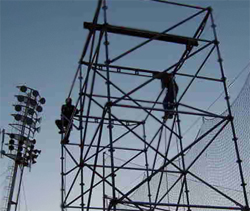
There are a number of firms in the United States that offer rigging inspections as part of their services.
Choosing one need not be a painful task. The theatre business is a very small industry and the number of companies offering inspections in this country even smaller.
Start your search with your local theatrical supplier who can usually refer a rigging inspector to you. If that doesn’t work, and you are a member of a theatre organization, ask them.
And if that doesn’t work, there is always the internetb. Two organizations that may help are USITT and ESTA.
Once you have found a company or person to talk to, here are some things that should help in judging who will be hired.
1) A formal proposal. This proposal should outline the costs for the project and tell you what their services will be.
You want to make sure that they will not only inspect the stage rigging, but also the equipment hanging from the rigging. They should also check out other areas where you may have equipment; for example, lighting positions over the seating area on pipes or catwalks.
The quality and clarity of the proposal is also a good indication of what the written report will look like.
2) Find out how long it will take to get the written report after the inspection is complete. Also find out what kind of information the report will give you.
Will it identify the problems found? Will the report also offer solutions to those problems and give you a cost estimate for those repairs?
3) Get references and check them.
Because theaters come in all shapes and sizes, it’s difficult to tell how long the inspection will actually take. For a typical high school theatre you should expect the inspection to take 4 to 6 hours.
A larger theatre, with more complicated equipment, will take longer. (Wolftrap Center for the Performing Arts in Washington D.C. takes 3 days!)
The costs for a rigging inspection vary from company to company but normally range from $500 to $1,000 just for the inspection. You will also be expected to cover any travel costs.
This might include airfare, a hotel room and meals, depending on where the inspector is located. (To save money on the airfare – up to 50% – try to schedule the inspection for a Saturday or Sunday, with the inspector staying over on Saturday night.)
Whatever you do, don’t ignore your stage equipment. Have your stage rigging inspected regularly. As stagehands are fond of saying, “Gravity still works but it’s not always your friend”.
Reprinted with thanks to Sapsis Rigging
